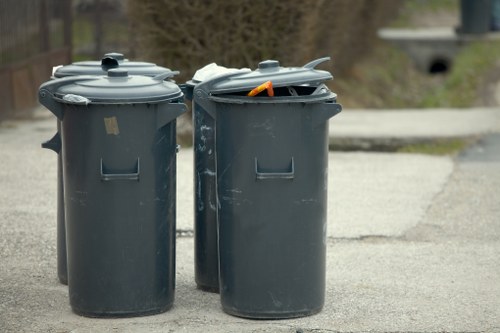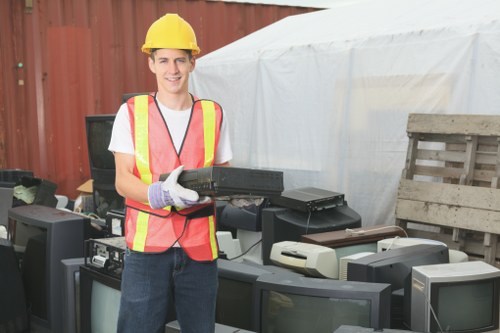Efficient Fridge Disposal in Rubbish Clearance: A Comprehensive Guide
Understanding the Importance of Proper Fridge Disposal

When it comes to rubbish clearance, disposing of large appliances like refrigerators requires careful consideration. Improper disposal can lead to environmental hazards, legal repercussions, and unnecessary clutter in your living space. Understanding the importance of proper fridge disposal ensures that your household contributes positively to environmental conservation while adhering to local regulations.
Refrigerators contain harmful substances such as refrigerants and insulating foams that can cause significant environmental damage if not handled correctly. Additionally, outdated or non-functional fridges take up valuable space and can attract pests, leading to potential health risks.
By prioritizing responsible disposal methods, you not only protect the environment but also promote a cleaner and safer living environment for yourself and your community.
The Environmental Impact of Improper Fridge Disposal

Disposing of a fridge improperly can have severe environmental consequences. Refrigerants like Freon (R-134a) are potent greenhouse gases that significantly contribute to global warming when released into the atmosphere. Moreover, the insulation materials used in fridges often contain harmful chemicals that can contaminate soil and water sources if not disposed of correctly.
Landfilling refrigerators leads to the release of these hazardous substances over time, exacerbating environmental degradation. Additionally, the metals and plastics in fridges take years to decompose, contributing to the growing problem of electronic waste (e-waste).
By ensuring that fridges are disposed of through proper channels, these harmful impacts can be mitigated, promoting a healthier planet for future generations.
Legal Regulations Surrounding Fridge Disposal

Various local and national regulations govern the disposal of large appliances like refrigerators. These laws are designed to protect the environment by ensuring that hazardous materials are handled safely and responsibly.
Understanding Your Local Regulations
- Some regions require that refrigerators be recycled through certified facilities.
- Certain areas mandate the removal of refrigerants by licensed professionals before disposal.
- There may be fines or penalties for non-compliance with disposal regulations.
It's essential to familiarize yourself with the specific regulations in your area to avoid legal complications and ensure that you're contributing positively to environmental conservation efforts.
Compliance with these laws not only safeguards the environment but also promotes sustainable practices within communities.
Steps to Properly Dispose of Your Fridge

Disposing of a fridge involves several steps to ensure that it's handled safely and responsibly. Here's a comprehensive guide to help you navigate the process:
1. Assess the Condition of Your Fridge
Determine whether your fridge is still functional. If it's repairable, consider donating it to those in need or selling it to extend its lifespan.
2. Contact a Professional Rubbish Clearance Service
Engage a reputable rubbish clearance service that specializes in appliance disposal. They will ensure that your fridge is handled in accordance with environmental regulations.
- Verify the company's credentials and certifications.
- Inquire about their recycling and disposal processes.
- Obtain an estimate for the disposal service.
3. Remove Hazardous Substances
Certified professionals will remove refrigerants and other hazardous materials from your fridge to prevent environmental contamination.
4. Recycling and Disposal
Once hazardous materials are removed, the remaining components of the fridge can be recycled. Metals, plastics, and glass can be salvaged and repurposed, reducing the need for raw materials and minimizing waste.
5. Final Disposal
Any non-recyclable parts will be disposed of following environmental guidelines to ensure minimal impact on the ecosystem.
Following these steps ensures that your fridge disposal contributes to environmental sustainability and complies with legal requirements.
Benefits of Professional Rubbish Clearance Services

Opting for professional rubbish clearance services offers numerous advantages:
- Expertise: Professionals are trained to handle the safe disposal of large appliances, ensuring that hazardous materials are managed correctly.
- Convenience: They provide a hassle-free solution, handling the entire disposal process from pickup to recycling.
- Compliance: Professional services adhere to local and national disposal regulations, preventing legal issues.
- Environmental Responsibility: They prioritize recycling and responsible waste management, minimizing environmental impact.
Choosing a professional service for your fridge disposal not only simplifies the process but also contributes to a more sustainable and eco-friendly community.
Contact us today to schedule your fridge disposal and make a positive impact on the environment.
Alternative Solutions for Fridge Disposal

If professional disposal isn't an option, consider these alternatives:
1. Local Recycling Centers
Many municipalities offer recycling programs for large appliances. Verify if your local recycling center accepts refrigerators and understand their specific requirements.
2. Retailer Take-Back Programs
Some appliance retailers offer take-back services when you purchase a new fridge. They handle the removal and disposal of your old appliance, ensuring responsible recycling.
3. Donation
If your fridge is still operational, consider donating it to charitable organizations or individuals in need. This extends the appliance's life and reduces waste.
Exploring these alternatives can provide cost-effective and environmentally friendly options for disposing of your old refrigerator.
Book your service now to take advantage of our hassle-free fridge disposal solutions.
Cost Considerations in Fridge Disposal

The cost of disposing of a fridge can vary based on several factors:
- Service Fees: Professional rubbish clearance services may charge based on the size and weight of the appliance.
- Recycling Fees: Some recycling centers charge a fee for processing large appliances.
- Disposal Costs: Landfill disposal incurs costs that are often regulated by local authorities.
Understanding these costs upfront can help you budget effectively for the disposal process. Additionally, some services may offer free pickup or discounts, so it's worthwhile to explore different options.
Investing in proper disposal methods can save you from potential fines and contribute to environmental sustainability.
Preparing Your Fridge for Disposal

Proper preparation of your fridge ensures a smooth disposal process:
1. Empty the Contents
Remove all food items and clean the interior to prevent unpleasant odors and pests.
2. Disconnect and Safeguard
Unplug the fridge and secure any loose components to prevent accidents during transportation.
3. Remove Doors and Accessories
Detach doors and any removable accessories to facilitate easier handling by disposal professionals.
4. Document Condition
Take photos or notes of the fridge's condition. This can be useful for insurance purposes or if any disputes arise during disposal.
Proper preparation not only makes the disposal process more efficient but also ensures compliance with disposal guidelines.
Contact us today to assist you with each step of the fridge disposal process.
Recycling Options for Refrigerator Components

Recycling is a key component of responsible fridge disposal. Here’s how different parts of the refrigerator can be recycled:
Metals
Refrigerators contain valuable metals like steel and aluminum, which can be recycled and repurposed into new products, reducing the need for virgin materials.
Plastics
The plastic components of fridges, including shelves and liners, can be recycled, provided they are cleaned and sorted correctly.
Glass
Glass shelves and components can be recycled, minimizing waste and promoting the circular economy.
Electronic Components
Modern fridges contain electronic parts that require specialized recycling processes to recover precious metals and reduce e-waste.
By recycling these components, we can significantly reduce the environmental footprint of our appliances and promote sustainability.
Book your service now to ensure every part of your fridge is recycled responsibly.
Health and Safety Considerations

Fridge disposal involves certain health and safety risks that must be managed carefully:
- Hazardous Materials: Refrigerants and insulating foams can pose health risks if not handled properly.
- Physical Injuries: Moving heavy appliances can lead to physical injuries without the right tools and expertise.
- Exposure to Contaminants: Improper handling can expose you to harmful substances present in old appliances.
By utilizing professional rubbish clearance services, you minimize these risks. Experts are equipped with the necessary tools and knowledge to handle and dispose of fridges safely, ensuring both your safety and that of the environment.
Prioritize safety by choosing responsible disposal methods for your old refrigerators.
Contact us today to safely and efficiently dispose of your fridge.
Conclusion: Making Informed Disposal Choices

Proper fridge disposal is a critical aspect of responsible rubbish clearance. By understanding the environmental impacts, legal regulations, and available disposal methods, you can make informed choices that benefit both your household and the planet.
Engaging professional services ensures that your old refrigerator is handled safely, recycled appropriately, and disposed of in compliance with all relevant laws. Additionally, exploring alternative solutions like donations or retailer take-back programs can offer cost-effective and sustainable disposal options.
Ultimately, prioritizing responsible disposal practices contributes to a cleaner environment, reduces waste, and promotes sustainability within your community.
Book your service now and take a step towards a greener future.